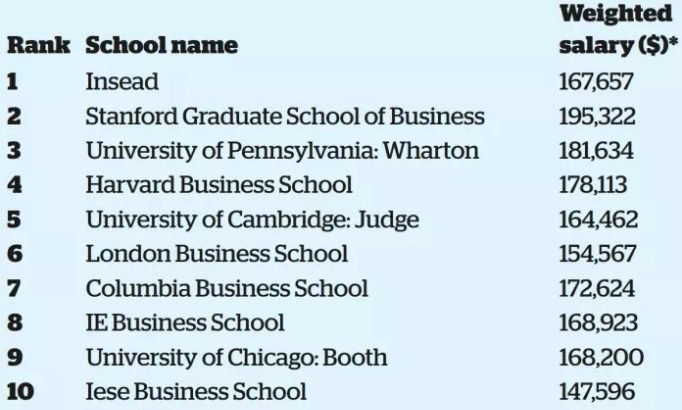INSEAD, Stanford Top Financial Times World MBA ‘17 Ranking

For the second year in a row, France and Singapore business school INSEAD topped the annual Financial Times‘ list of the world’s best full-time MBA programs. INSEAD was followed by the Stanford Graduate School of Business and The Wharton School at the University of Pennsylvania.
The methodology behind the construction of the Financial Times world full-time MBA list is simple:
The ranking is based on surveys of the business schools and their graduates of 2013. MBAs are assessed according to the career progression of alumni, the school’s idea generation and the diversity of students and faculty.
Meaning, that the list isn’t simply ordered by the annual average salary of those graduates surveyed, nor just isolating their individual approval of their time with the schools. For instance, despite being second on the list overall, Stanford GSB grads earned the highest average annual salary ($195,000). The reason INSEAD came ahead, despite a near $30,000 annual difference, was much higher rankings in the categories of value (11th overall) and international mobility.

For the first time in nine years Harvard Business School fell out of the top three while the London Business School fell to sixth, its lowest spot in 14 years. This also marks for the first time in the history of the ranking that LBS was not the first UK school on the list, supplanted by the University of Cambridge: Judge. As well, not listed in the top ten for the first time in 10 years—perhaps surprisingly—is the MIT Sloan School of Management.
Judge in particular may be the most outstanding winner of the ranking keeping in mind that just five years ago the school ranked 26th overall. Judge’s accolades stem from the tremendous value (1st overall). Tuition at the school is the cheapest among all selected in the top 15 and the opportunity cost was considered the 2nd best in the world.
Fifty-one U.S. schools managed a spot on the ranking (up from 47 in ‘16), including the Rutgers Business School, which was the highest new entrant at 70. The Mendoza College of Business at the University of Notre Dame saw the biggest increase from the previous year, moving up 16 spots to 60th overall (the school jumped 13 spots the previous year as well).
However, Canadian schools fell back slightly with only three making the top 100. The Rotman School of Management at the University of Toronto was the highest-ranking of the three at 65th.
Read the entire list and analysis here.
The Global MBA Experience at London Business School

One of the primary social impacts of increasing globalism is the sense that world feels like it’s shrinking. But for business, that means there are opportunities for expansion unlike ever before. As it has become easier than ever to communicate and work together across vast distances, so too has it become more likely for organizations to grow their businesses. And according to a recent YouGov Survey, globalization is still seen as a force for good rather than bad in the world.
“Unsurprisingly, the countries that are the biggest enthusiasts of globalization are the ones that have benefited most from it—the poorer nations of East and South East Asia,” it explains. “Here, belief that globalization is a force for good reaches at least 70 percent in all countries …”
For that reason, it has become more important than ever for MBAs to gain a global perspective of business while in school. Not only do MBAs with global experience better understand the impact of language, culture, traditions, government, legal structures and politics on business, but they’re also more likely to be able to make use of opportunities that international markets present.
The Global MBA Experience
So, what makes an MBA program global? There are a few factors that go into it including:
- Diversity of students and faculty.
- International orientation of curriculum and course material.
- Employment and recruitment opportunities for graduates.
- Reach of the alumni network.
- Location of the school.
- Partner programs.
Global MBA programs tend to offer a level of international exposure for students and faculty that is not often seen within a traditional, local MBA program. This means that group projects and discussions aren’t based on a single viewpoint but rather reference a variety of regions and countries. These programs also typically include opportunities for additional learning in another country through exchange programs or geographically diverse recruiting partners.
And there’s no hiding the fact that a Global MBA experience benefits both students and companies. McKinsey & Co. analysis shows that companies with a more diverse workforce perform better financially than respective national industry medians. Harvard Business Review recently wrote on the topic as well, saying, “by correlating diversity in leadership with market outcomes as reported by respondents, we learned that companies with 2-D diversity out-innovate and out-perform others.”
Global Business Experiences at London Business School
It’s for this reason and many others that the London Business School has made globalization a priority. Gareth Howells, the Executive Director of MBA & MIF Education, explained it this way. “At London Business School, being global is in our DNA and informs everything we do. By further expanding our reach through the expansion of our global menu, we believe we can ensure our graduates create value and impact all over the world. Global talent is an integral part of today’s workplace with everyone seeking to create success in a multicultural environment.”
Not only is the London Business School 2018 MBA class made up of 70 nationalities, but the school is also about to add even more of a global experience to its MBA program thanks to their Global Business Experiences (GBEs). Each GBE is a week long program that consists of faculty briefings, guest speakers, site visits, workshops, panels, company visits and opportunities to engage with local LBS alumni in each region.
The GBE program gives students the opportunity to apply their academic learning in a real-life, global business environment and ensures students have the skills to constantly evolve their global mind-set. The goal of the program is to help MBAs flourish outside of their comfort zones and to gain familiarity and experience working with classmates and within organizations from different cultures and industries around the world.
The best part about the GBE is that no program is the same. Each experience changes with the location and the organization hosting the experience. Starting this August, MBAs at the London Business School will:
- Experience two new regions for the GBEs including Lima and Tel Aviv.
- Have additional language opportunities: Italian and Japanese have been added to LBS’ existing provision of French, Mandarin, German, Russian, Portuguese, Arabic and Spanish.
- Increase their knowledge with the Global Business Practice course supporting students with cultural awareness.
GBE Student Experience
Below are two student testimonials about the Global Business Experience at LBS.
“What appealed to me was the fact that this GBE had a component where I was working with an entrepreneur,” explained Jenny Troung, a 2013 MBA student who visited South Africa. “This meant that what I was doing in those five days was related to what I had been learning in the previous year. We helped the entrepreneur with his accounting to figure out if it is more profitable to sell a chair compared to an ottoman. And that was real business insight that I had to apply from School.”
“My GBE in Johannesburg was life changing,” described Marie Milleron, a 2015 MBA student. “Whether it was helping our township entrepreneur with the little resources she had, or understanding the challenges of a developing economy with a heavy past, it was a unique time of personal growth and reflection.”
To learn more about the GBE program at London Business School, visit the school website.
Holiday Debt Hangover: The Dangers of Contactless Payment

The holidays may be over, but for many they are far from forgotten. For kids, the holiday joy continues with toys and games, but for adults, the holiday hangover might not be as pleasant. In fact, according to Niro Sivanathan, bssociate professor of organisational behaviour at London Business School (LBS), the holiday hangover could mean an unprecedented amount of festive debt. The truth is that in 2016, more people than ever used touchless payment to make their holiday purchases, and that comes with some consequences: the holiday debt hangover. Continue reading…
Forté Foundation Launches New Men as Allies Initiative

Reaching gender equity on business school campuses is far from just a women’s issue, which is precisely why the Forté Foundation is calling on men to get involved. Drawing on successful programs already underway on campuses spanning from Harvard Business School (HBS) to Stanford Graduate School of Business, Forté today announced its new Men as Allies Initiative. It is designed to invite and encourage male students to get involved in a growing movement toward gender equity in business school classrooms and the broader business world.
The idea for the new initiative grew out of a session with sponsors at Forté’s annual conference focused on HBS’s Manbassadors ally group, according to Forté Executive Director Elissa Sangster. Forté is a non-profit consortium of leading corporations and top business schools committed to helping women lead fulfilling careers in business. “We started talking with our sponsors about how Forté could support similar initiatives at our member schools’ campuses,” she says. “We began to brainstorm about what we could provide so it didn’t end up that every time someone wanted to do this they had to call the Manbassadors and ask them the same questions over again.”

Forté recognized at least ten top business school campuses that already have male ally programs in place. HBS, Kellogg’s Northwestern School of Management and Duke’s Fuqua School of Business led the charge, forming their groups in 2013. The following year, UCLA Anderson, Michigan’s Ross School of Business, the University of Pennsylvania’s Wharton School and Stanford GSB got with the program. In 2015, Columbia Business School and NYU Stern joined in, and London Business School (LBS) created its own club earlier this year. Calling themselves everything from Manbassadors (Anderson, HBS, LBS, CBS) to WiMEN (Stanford) to the 22’s (Wharton, a reference to the 22 percent gain necessary to close the gender pay gap), the groups work in partnership with women’s business organizations on campus to adopt behaviors that support gender equity in classroom discussion and beyond.
Conducting focus groups with existing groups, Forté began to collect information on what has been successful, what pitfalls and challenges can be avoided and what types of events and activities best serve to open up dialogue. “We also conducted external environmental research, identifying inspirational role models and people leading the charge in the business world,” Sangster says.
The new Forté Men as Allies Initiative is designed to provide potential male allies at schools that don’t already have existing groups with the tools they need to establish their own Manbassador-type groups. As part of the new initiative, Forté has launched a new “Men as Allies” website featuring a toolkit geared toward male students that includes reasons to start a group, steps to follow to do so and information on activities and events that have been successful on other campuses. “Our hope is that as men graduate from MBA programs, they are able to take some of these skills they have been developing and look for ways to engage in the workforce and make that impact even more widespread,” Sangster says.
A Tipping Point
There has been a growing movement in recent years to enhance gender equity in business and society, evidenced by the United Nations’ HeForShe initiative, Catalyst’s Men Advocating Real Change (MARC), and the White House’s Let Girls Learn program. In summer 2015, the 47 business school leaders convened at the White House specifically to address the gender imbalance among MBA classes. In addition to male ally groups, many business schools also feature school-wide initiatives designed to tackle gender equity at the cultural, academic and admissions levels, such as the Gender Equity Initiative (GEI) at UC Berkeley’s Haas School and the HBS Gender Initiative.
“We may have reached a tipping point as more women are pursuing an MBA and more men are interested in supporting gender equity,” Sangster continued. “While we are making great progress, and getting closer to 40 percent women’s enrollment at our member business schools, initiatives like this one that foster inclusiveness, will help us get to gender parity faster.”
Carnegie Mellon University’s Tepper School of Business, Cornell’s Johnson Graduate School of Management and Georgetown’s McDonough School of Business provided generous financial support of Forté’s new initiative, and diversity experts Anne Weisberg and Lisa Levey, among others, contributed to its development.
Sangster points out that there are multiple benefits for men who get involved in gender equity initiatives. “It gives them insight and information and resources to use in developing their own leadership styles and creating their own perspective on what’s important not only to advance women in the workforce but also just to be a well-rounded advocate and manager of talent in their organizations,” she says. “It’s really about fine-tuning their leadership perspective and leadership skills. Business school is a safe place to stretch your muscle in this area and think hard about the kind of leader you want to be and how to become that leader.”
London Business School Leads 2016 Bloomberg BusinessWeek International MBA Rankings

London Business School (LBS) climbed to the very top spot on Bloomberg BusinessWeek’s ‘Best International Business Schools of 2016‘ list, released yesterday, up a notch from last year’s second-place showing. INSEAD, which has campuses in France, Singapore and Abu Dhabi, followed right behind, inching up from number three last year to second place this year. The United Kingdom’s other powerhouse business schools, Oxford’s Saïd Business School and Cambridge’s Judge Business School, fell in line at third and fourth respectively, representing a three-spot jump for Saïd over last year and a four-spot jump for Judge. Spain’s IESE also experienced gains year over year, sidling up two spots from last year’s seventh place to round out this year’s top five.
But as some schools inched up, others fell—most notably Western University’s Ivey Business School in Canada, which plummeted from the number one spot last year to 10th in 2016. Spain’s IE Business School and Switzerland’s International Institute for Management Development (IMD) each slipped two spots, to sixth and seventh this year. But Italy’s SDA Bocconi School of Management sauntered up four spots from 12th last year to land comfortably within the top 10 this year, at number eight. And Melbourne Business School has perhaps the most cause for celebration. The Australian school shot up a whopping 14 places to come in at number nine.
Like Bloomberg BW’s U.S. MBA rankings, released last month, its international MBA rankings are compiled using a methodology that assesses schools based on five factors: a survey of MBA recruiters, weighted at 35 percent; an alumni survey, weighted at 30 percent; a survey of the 2016 graduating class, weighted at 15 percent; the school’s placement rate, weighted at 10 percent, and the starting compensation for the class of 2016, weighted at 10 percent.
What this means, as the magazine points out, is that “it’s possible to rank highly without knocking every category out of the park.” Case in point, INSEAD came in second overall even though it ranked a meager 25th (out of 31) for job placement. (Bloomberg BW measures job placement as the percentage of graduates who land full-time employment within three months of graduation out of those seeking it—the figure reported by INSEAD was 81.6 percent, compared to an average 85.9 percent among all schools).
In terms of pay growth enjoyed by graduates of the 31 schools included in Bloomberg BW’s list, students came in at an average salary of $50,000, jumped to an average starting salary of $90,000 for their first job out of school and reported an average salary of $141,750 six to eight years out from graduation. The average MBA debt taken on by graduates across all ranked schools, meanwhile, was $40,000.
At a glance, here are the top 10 best international MBA programs in 2016 as ranked by Bloomberg BW:
- London Business School
- INSEAD
- Oxford (Saïd)
- Cambridge (Judge)
- IESE
- IE
- IMD
- SDA Bocconi
- Melbourne
- Western (Ivey)
As always, those of us here at MetroMBA encourage applicants to use rankings as just one of many means of evaluating which MBA program is the best fit to their individual needs and goals.
This article was republished with permission from Clear Admit.
Professor to Know: Alex Edmans, London Business School

There’s one thing that every top business school around the world has in common: impressive faculty. That’s because MBA programs know that their offerings are only as exceptional as their professors, and that’s definitely the case at the London Business School.
Faculty at LBS are at the forefront of innovative business thinking. They’re influential business leaders, managers and policy makers who conduct world-class research and teach topnotch courses. In fact, according to a recent review published in 2014, London Business School received a top four rating for its research performance. And there’s no better representation of LBS’s faculty than finance professor Alex Edmans.
About Professor Alex Edmans
Professor Edmans graduated from Oxford University in 2001 with his bachelor’s degree in Economics and Management. From there, he pursued a career at Morgan Stanley working in investment banking and fixed income sales and trading. Then, a few years later in 2003, he went back to school to receive his Ph.D. in Finance from MIT Sloan as a Fulbright Scholar. In 2007, he became a professor at Wharton, earning his tenure by 2013 before moving to LBS. And, so far, Professor Edmans’ teaching career has been prestigious.
Over the past six years, he’s won 14 teaching awards. At Wharton, he was the highest-rated finance professor in the MBA program before his departure and was even chosen as the Faculty Graduation Speaker to the MBA class of 2014. And then, just this year at LBS, he was given the MBA Class of 2016 teaching award for the highest-rated professor school-wide and the Best Teacher: MBA 2016 award.
Outside of his exceptional teaching, Alex Edmans is a prolific researcher, blogger and Twitter user (you can follow him @aedmans). His blog, Access to Finance, covers a variety of topics and excels at making finance research available to anyone and everyone. It’s written for people with a non-finance background who might not normally be interested in finance but want to stay on top of current trends and events.
As for Edmans’ research, his most recent publication was published in the Journal of Financial Economics on October 27, 2016. Titled “The Source of Information in Prices and Investment-Price Sensitivity,” it discusses the value of financial markets to the real economy. Other research topics have included “Equity Vesting and Investment,” “Blockholders” and “Governing Multiple Firms.”
As you can see by just the most basic facts, Alex Edmans isn’t an ordinary professor. But that’s just the surface. We wanted to get to know Professor Edmans, so we asked him five questions about his life and work as a faculty member at the London Business School.
- What do you love most about teaching at the London Business School?
I really enjoy the diversity of the student body—not just nationalities, but also educational and career backgrounds. This brings lots of different perspectives to class.
I also enjoy the fact that I teach core courses. It’s easy to teach an elective since students have self-selected into the class, so you know they’ll like it. The core is challenging because I teach students who may not like finance, may even be scared of finance, and only take it because they have to. I like this challenge. It means that I have to make finance interesting and accessible, and hopefully, students end up enjoying the class even if they dreaded it to start with.
- What do you hope students take away from your research, teaching, and speaking?
Teaching: I would like students to be able to think for themselves and understand the intuition behind the concepts, which they can apply to any real-world situation—rather than just knowing the formulas that they can plug numbers into in order to solve an exam problem.
Research: The importance of large-scale, rigorous, academic research in a world where policy is increasingly formed on anecdote or myth. That “academic” research isn’t irrelevant but has substantial relevance for the real world.
Speaking: I give a number of talks on personal leadership, not just finance. I would like students to choose careers that are personally fulfilling, rather than just the career that happens to be hot at the moment. And I would like students to be mentally present in everything they do, not just physically present.
- In an era where corporate responsibility is becoming more important than ever, what do MBAs need to know and keep in mind?
That companies should do things for intrinsic and not instrumental value—even if there is no clear profit benefit for an action. This applies to your personal life too—to help a classmate even if you don’t clearly benefit from it, or learn something even if it won’t be on the exam.
- Which of your blogs would you most recommend for MBAs to read?
My blog, Access To Finance, aims to make finance accessible to a general audience by taking complex academic papers, or topical issues (such as Brexit or the current debate on executive pay), and making them simple. Which articles in the blog to read depends on the MBA’s interest, and so it’s hard for me to recommend some over others. My Twitter feed @aedmans also aims to showcase simple, accessible articles on real world finance.
I would also recommend two talks that I gave which may be of particular interest to MBAs. One is my TEDx talk, “The Social Responsibility of Business”, on the business case for sustainability, and the other is “Fulfilling Careers and Full Lives”, the final lecture of my MBA course, which is similar to a graduation speech in that it provides general advice for how MBAs can make the most of their talents and opportunities to serve society, but aims to do so in a concrete and actionable rather than sugary and saccharine way.
- What makes your teaching/classes different at LBS?
In every class, I have an “extra-curricular break,” which takes a complex academic paper with real-world relevance and makes it accessible for a practitioner. Indeed, my blog spun out of these extra-curricular breaks.
- While a core class is theoretical and rigorous, I always try to emphasize the evidence to the real world, drawing from my own practitioner and policy experience.
- I cold-call students. This is absolutely not to scare them, but to keep the class interactive and the students engaged, and to give the students practice in solving problems themselves, rather than just following someone else. It also ensures the pace of the class is not dictated by the students with finance backgrounds; cold-calling means that a broad set of students end up contributing.
- I play music before class and during the breaks, and dress down. This is absolutely not intended to be a gimmick. Instead, it is to conduct class in as relaxed an atmosphere as possible, to make students relaxed about asking questions and not be afraid to be cold-called. The music aims to bring energy to the class, which is particularly important when studying finance at 8:15 am on Monday morning!
